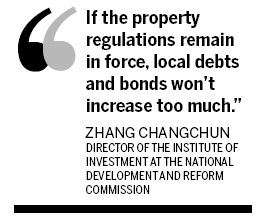As urbanization gains more attention from policy-makers, concerns have been emerging that future investment will raise local governments' already heavy debt burden and increase the risks for China's economy.
New bonds have enjoyed growth of around 30 percent in 2012, and have become an important source of funding for local governments, gradually replacing bank loans.
More companies have given more preference to the bond market, not only due to tightening credit and money supply, but also due to its relatively low costs, said analysts.
Local governments set up many financing vehicles after the sharp reduction in local revenues caused by the taxation system reform in 1994. As an extension of the government, financing vehicles help it seek funding for infrastructure construction through channels including bank loans and investment bonds.

In China, three regulators manage bond issuance: The National Development and Reform Commission controls corporate bonds issued by State-owned enterprises; the China Securities Regulatory Commission is in charge of bonds issued by listed companies; and the central bank looks after commercial paper and medium-term notes traded in the interbank market.
Bonds issued by local financing vehicles are regarded as corporate bonds, supervised by the NDRC.
According to Huatai Securities, new corporate bonds issued in the first 11 months of 2012 totaled 722.35 billion yuan ($116 billion), among which 401 billion yuan were issued by local financing vehicles, accounting for 56 percent of corporate bonds.
Zhang Changchun, director of the Institute of Investment at the NDRC, said that the scale of the bond market will continue to increase in 2013, as the central government has indicated that it will stick to a proactive fiscal policy in 2013.
"Urbanization will lead to growth in investment, but the central government has also emphasized the quality of urbanization, so I think investment will speed up at a reasonable pace," said Zhang.
Tightening measures on real estate in 2012 have affected local governments' ability to repay debts as land revenues are a major contributor to local coffers.
"If the property regulations remain in force, local debts and bonds won't increase too much," said Zhang.
China's local government debts reached 10.7 trillion yuan at the end of 2010, equivalent to around 27 percent of the gross domestic product, according to a report issued last year by the National Audit Office.
The nation's overall risks are controllable despite concerns that some local governments are facing higher risks in repaying their debts, said Zhang.
As they are regarded as corporate bonds, the government has no obligation to pay financing vehicles' debts if they face a default, he said. However, many still expect the government will bail them out in the event of a default.
Chen Wei, an analyst at Minzu Securities, said that policymakers also stressed the need to control risks in the financial system and increase the capital supply next year, including loans, which probably means the authorities won't let local financing vehicles issue too much debts.
"Urbanization won't be so rapid as people imagined. The investment scale will grow in the coming year but won't be too high," he said.
By the end of 2011, China had 9,828 local financing vehicles, with around 61 percent of these at county level, raising finance for urban infrastructure, such as railways, ports and water projects, according to Chen.
lanlan@chinadaily.com.cn
